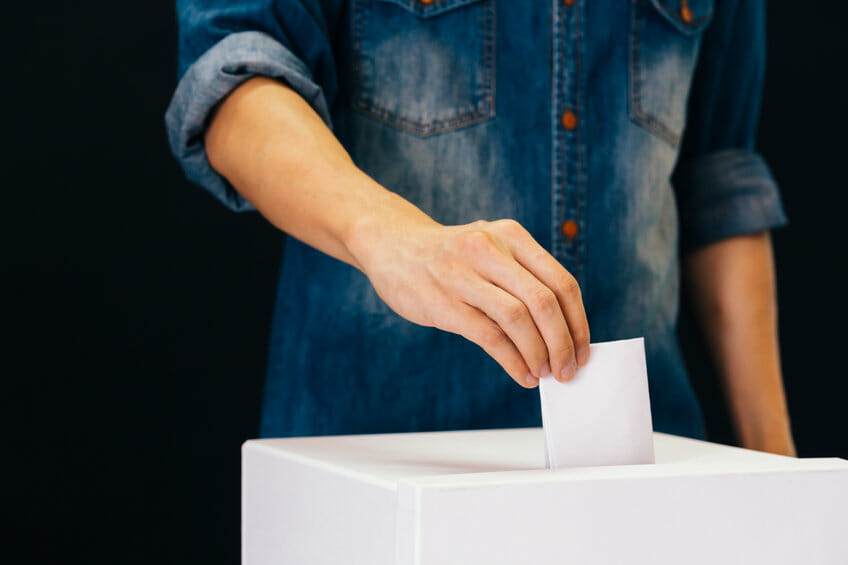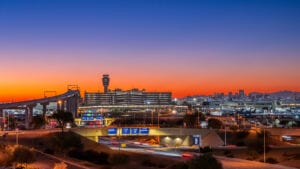Monday marked the deadline for candidates running for office in Arizona to submit the required signatures to qualify to appear on the ballot for the August 2 primary election.
In order to appear on the ballot in Arizona, candidates running for a political party’s nomination must gather at least 0.5% of a race’s eligible voters. Candidates running for statewide office or U.S. Senate must gather the signatures of 0.25% of all Arizona voters.
READ ALSO: Here’s how Arizona’s economy is breaking new ground again
In lieu of traditional petition sheets, candidates may gather “signatures” online through E-Qual, an online portal managed by the Arizona Secretary of State. This year, E-Qual has faced periodic outages as the software was updated to reflect redistricting.
Arizona does not have run-off elections, allowing candidates to advance to the general election with a plurality of votes.
Candidates who have not submitted enough signatures to qualify to appear on the primary ballot can seek a party’s nomination for an office as a write-in candidate. Write-in candidates seeking party nomination have until June 23 to file to run. The deadline for independent write-in candidates to file to run is September 29.
U.S. Senate
Senator Mark Kelly will be the only Democrat on the ballot. Kelly is seeking re-election to a full six-year term, after finishing the remaining two years of a seat originally won by Sen. John McCain in 2016.
On the Republican side, five candidates qualified for the ballot:
• Mark Brnovich, Arizona Attorney General since 2015. Brnovich appears to be the current frontrunner, according to polling.
• Jim Lamon, solar energy executive
• Blake Masters, tech executive
• Michael “Mick” McGuire, former Adjutant General of the Arizona National Guard and Major General in the U.S. Air Force
• Justin Olson, former state legislator and current member of the Arizona Corporation Commission since 2017
Governor
Three candidates will appear on the Democratic primary ballot.
• Katie Hobbs, current secretary of state and former state legislator. Hobbs is her party’s current frontrunner according to polling.
• Aaron Lieberman, former state representative
• Marco Lopez, former mayor of Nogales; former director of the Arizona Department of Commerce, and former chief of staff of U.S. Customs and Border Protection
Six candidates qualified for the Republican primary ballot. With six candidates, a candidate will be able to secure the nomination with as little as 17% of the vote.
• Steve Gaynor, small-business owner and 2018 Republican nominee for secretary of state
• Kari Lake, former television news anchor
• Scott Neely, small-business owner
• Matt Salmon, former U.S. representative, former legislator, and former chairman of the Arizona Republican Party
• Karrin Taylor Robson, former member of the Arizona Board of Regents and an Arizona business leader
• Paola “Z.” Tulliani-Zen, conservative activist
Gov. Doug Ducey, a Republican, is term limited and cannot run for a third term.
U.S. House of Representatives
Incumbent Rep. David Schweikert is running for reelection in Congressional District 1. Schweikert will appear alongside Republicans Elijah Norton and Josh Barnett on the primary ballot. The district, formerly Congressional District 6, is more Republican after redistricting. Democrats Jevin Hodge, Adam Metzendorf and Ginger Torres are vying for the Democratic nomination.
In Arizona’s new 4th congressional district, a swing district comprising Tempe, west Mesa and parts of Phoenix, six Republicans will be on the primary ballot. The nominee will face incumbent Rep. Greg Stanton.
In Congressional District 6, Republican Juan Ciscomani gathered more than twice as many signatures as other Republicans. The new district represents part of Tucson and the southeast corner of Arizona. The Republican nominee will face off against either Daniel Hernandez, Kirsten Engel or Avery Anderson. Hernandez is a current member of the Arizona House of Representatives and Engel is a former member of both the Arizona Senate and House of Representatives.
Incumbent Reps. Debbie Lesko and Andy Biggs, both Phoenix-area Republicans, will not face a challenger on the ballot from either party.
Secretary of State
Republicans Shawnna Bolick, Mark Finchem, Beau Lane and Michelle Ugenti-Rita have qualified for the ballot. Ugenti-Rita is currently a state senator. Bolick and Finchem are both currently members of the Arizona House of Representatives. Lane is an advertising executive.
For the Democrats, Minority Leader of the Arizona House of Representatives Reginald Bolding and former Maricopa County Recorder Adrian Fontes are seeking to succeed Hobbs and have qualified for the ballot.
Attorney General
Democrat Kris Mayes will appear on the ballot in November. Mayes is the former chair of the Arizona Corporation Commission and the only Democrat to qualify for the ballot.
Republicans who have qualified for the ballot are:
• Lacy Cooper, a former assistant U.S. attorney
• Rodney Glassman, an attorney in private practice and a former Tucson city councilmember
• Andrew Gould, former Arizona Supreme Court Justice
• Dawn Grove, general counsel for Karsten Manufacturing
• Abraham “Abe” Hamadeh, former Army captain and a Maricopa County prosecutor
• Tiffany Shedd, former Republican nominee for U.S. House
Treasurer
Current State Treasurer Kimberly Yee is running for re-election and has qualified for the ballot, in addition to state Rep. Jeff Weninger. Financial executive Bob Lettieri also qualified to be on the ballot.
Current state senator Martin Quezada was the only Democrat to gather enough signatures.
State Senate
There are currently 16 Republicans and 14 Democrats in the Arizona Senate.
Republican David Farnsworth, a former legislator, will face the current speaker of the Arizona House of Representatives, Rusty Bowers in Legislative District 10’s Senate primary. District 10 is centered around eastern Mesa.
Republican state Sen. Nancy Barto and Democratic state Sen. Christine Marsh will likely face each other in Legislative District 4’s general election, as no other candidates qualified for either party’s primary. Legislative District 4 is centered around Paradise Valley and Scottsdale.
Republican state senators Wendy Rogers, who was recently censured by the Senate, and Kelly Townsend both qualified for the primary ballot in Legislative District 7, where the winner of the Republican nomination will face Democrat Kyle Nitschke. Legislative District 7 includes parts Coconino, Gila, Navajo and Pinal counties.
State House
There are currently 31 Republicans and 29 Democrats in the Arizona House of Representatives. Two Representatives are elected in each legislative district.
Six Republicans qualified for the ballot in Legislative District 4. Matt Gress, director of Gov. Ducey’s Office of Strategic Planning and Budgeting, submitted by far the most signatures.
Rep. Brenda Barton, Rep. John Fillmore and Rep. David Cook, will all be on the ballot and will face off for the Republican nomination in Legislative District 7.
Maricopa County Attorney
A special election for Maricopa County Attorney will be held this cycle, after Maricopa County Recorder Allister Adel’s resignation. November’s winner will serve until January 1, 2025.
Julie Gunnigle is seeking the Democratic nomination and will be the only Democrat on the primary ballot. Gunnigle was the Democratic nominee in 2020.
Republicans Anni Foster, Gina Godbehere and Rachel Mitchell will all be on the primary ballot.
Author: Arjun Rondla is an undergraduate studying political science and international trade at Arizona State University and an intern at the Arizona Chamber of Commerce and Industry.




